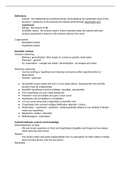Exam (elaborations)
Intro to Organismal Biology (BIO1130) - University of Ottawa
- Institution
- University Of Ottawa (U Of O )
This document contains extensive review exam notes for the BIO1130 class at the University of Ottawa for Mr. Chapleau's class. At the end, there are also some practice questions and answers to them for practice.
[Show more]



